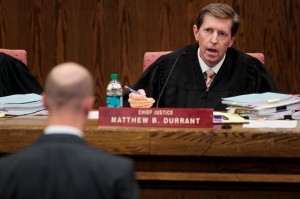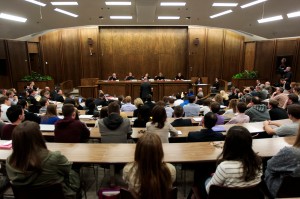
The Utah Supreme Court held two cases at BYU’s J. Reuben Clark Law School last week as part of a yearly tradition, giving students the opportunity to see the law in action.
Kristin Gerdy, law professor and director of the law school’s Rex E. Lee Advocacy Program, said all first-year law students are required to attend the event and many upper-level students decide to attend as well.
“I can see (benefits) for both the first-year students and the upper-level students,” she said. “They spend most of their first year of law school reading the opinions that come out of the Supreme Court or other appellate courts, so to see the process through which those opinions are actually developed in the conversation with the attorneys is useful for them as they read and analyze those opinions.”
She said many students who begin law school have only seen trial courts or court cases as portrayed on TV.
For first-year BYU law student Luke Bell, this was his first time seeing the law in action on an appellate level.
“It was cool to see the law come to life during the oral arguments,” he said. “One of the things I learned is being prepared for a lot of different questions as an attorney. … And I guess secondly it’s just sort of remembering the people behind every case and like the real stories going on. And balancing that with the rule of law.”

Gerdy said the Supreme Court specifically chooses cases that are both interesting and applicable to what the first-year law students are currently learning in class.
“They do try to pick something that’s going to be interesting,” she said. “They don’t want some really dry, boring, esoteric topic. They want something that’s going to … show off to the students good legal analysis.”
This year, the students saw the oral arguments for two cases: Mika Scott v. Universal Industrial Sales Inc., et al. and Sergio Alejandro Meza v. State of Utah.
Another first-year law student, Jordan Smith, said she was excited because the Mika Scott case coincided with what they are studying in their torts class about the duty of protecting someone with a special relationship.
“They might be changing the law on that right now, and that is really interesting to see it happening in real life and to see it affecting Utah specifically,” she said. “This is a first for a lot of us (first-year students), and it’s really exciting.”
Gerdy said the yearly Supreme Court visits have been going on since her own days at the law school in the ’90s. She said she thinks the Supreme Court Justices enjoy the opportunity to be directly involved with the education of future law students.
“It’s our honor to be able to hold court here in this law school,” said Utah Supreme Court Chief Justice Matthew B. Durrant when he opened the event. He was joined by Justices Christine M. Durham, Jill N. Parrish and Thomas R. Lee — a former BYU law faculty member — and Judge Stephen Roth of the Court of Appeals.




